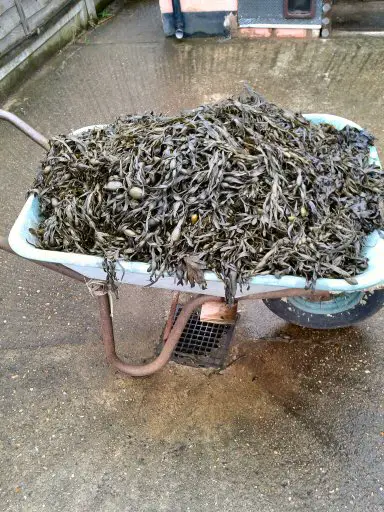Last Updated on April 4, 2024 by Real Men Sow
On Monday, Wellywoman published a really good post about using seaweed as manure. This was rather timely for me, as I have been collecting my own barrowful of slimy weed to experiment with this year. In fact, I’m preparing to dig a batch during the coming weekend.
Why Should You Use Seaweed As Fertilizer
I learned a lot from Wellywoman’s post, and it covered all the excellent reasons for using seaweed, such as the weed containing all the main nutrients plants require increased resistance to frost damage and pest attack, and an ability to improve the condition of clay soils.
Similar to homemade liquid fertilizers, you can use seaweed to your advantage too!
If seaweed is something you’ve considered, I very much recommend reading the post, which can be found by clicking here.
Seaweed as Fertilizer
I also discovered a little snippet of potato trivia – once upon a time farmers on Jersey used nothing but seaweed to fertilise their famous Royal potato, and credited it with the spud’s unique taste.
Although seaweed isn’t used on a wide scale anymore, a few farms on the island do employ it, and this has inspired me to try and create my own Burnham-on-Crouch Royals, using the traditional International Kidney seed potatoes.
Extra Benefit of Seaweed to Fertilize Plants
I haven’t been washing the salt off the seaweed, as the RHS says not to worry. This kind of makes me happy, as the nearby river is the same one that the famous Maldon Salt comes from. My soil better appreciates the gourmet product it is being fed.
Permission to Harvest Seaweed For Fertilizer
Advice on the web seems to suggest that permission is necessary to harvest seaweed, but I’ve seen people collecting it on the TV without mentioning this. I was also reminded on Twitter last night that the guys from Edwardian Farm used seaweed as a free, plentiful source of fertilizer.
Not that I’d wish to promote law-breaking, but I reckon that unless you’re looking to harvest on a scale fit for export to Japan, I’m sure no one would object to you taking some seaweed. If you’re worried, I’d recommend contacting your local Council or harbour master.
Don’t Remove All Seaweed to Protect the Habitat
As a fisherman as well as an allotmenteer, one thing I do is take care not to remove too much from one area, or dislodge rocks in the process as these provide important habitat for estuary creatures such as crabs.
Another thing I tend to do while fishing is cursing the seaweed over and over again, as it wraps around my line. This is particularly the case in the warmer months when there are tonnes of the stuff in the estuary.
Perhaps freeing oodles of the weed from my fishing gear might not seem such a chore if I knew that my veg patch was prolific and nutrient-filled.
Here’s hoping for a plentiful summer…


Hi Jono
I am wondering whether seaweed would be particularly with asparagus. I think I read that they grow naturally near the sea so would have thought it would give them all they need.
I would be really interested to read any future posts on how you get on with the seaweed as its not something I’ve ever tried. Although it is often stated as a source for organic plant feeds.
Hi Claire, thanks for your comment.
The asparagus idea is an interesting one. I think you’re right about them growing near the sea – I’m sure they’re a relation of the samphire?
Will let you know how I get on.